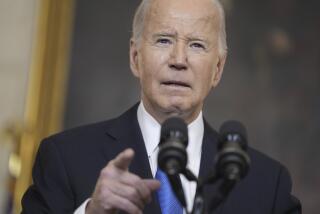Senate health debate hits snag over imported drugs
- Share via
Reporting from Washington — Expanding access to low-cost prescription drugs from overseas might look like a sure winner in the effort to make healthcare more affordable. President Obama supports the idea, as do many Democrats and several Republicans.
But the seemingly popular proposal brought the Senate healthcare debate to a standstill Thursday, as Democrats divided over whether they should bow to the drug industry’s fierce opposition.
Majority Leader Harry Reid (D-Nev.) temporarily halted consideration of the healthcare bill after three days of inconclusive debate on an amendment by Sens. Byron L. Dorgan (D-N.D.) and John McCain (R-Ariz.). The provision would allow pharmacies and wholesalers to import drugs from countries with safety standards comparable to America’s.
Despite Obama’s support for importation, the White House fears that if the amendment is approved, the drug industry will oppose the bill.
Industry support is considered a key to passage. That is why the White House negotiated a controversial deal to limit the financial effect of the overhaul on the industry in exchange for its support.
The drug-import amendment was not part of that negotiation, but it was widely believed that the industry would oppose the bill if such an amendment were included. Around the time of the negotiations, the White House issued a statement saying that importation legislation would not be necessary if a healthcare overhaul were enacted, because the overhaul would result in generally lower costs.
Earlier this week, the Food and Drug Administration announced in a letter that it opposed Dorgan’s amendment because it would be “logistically challenging” to implement and raised “significant” concerns about drug safety.
Democrats from states with major drug companies strongly oppose the amendment. One of them, Sen. Frank R. Lautenberg (D-N.J.), offered an alternative to address the safety concerns.
In the past, supporters of easier importation have seen similar amendments as “poison pills” -- effectively neutering the proposal by requiring U.S. officials to certify in advance that imported drugs would be safe and effective.
The George W. Bush administration also cited safety issues in opposing importation.
Even as the prescription-drug debate brewed Thursday, Democratic leaders tried to build momentum behind the tentative compromise on a more central problem: the dispute over a government insurance plan.
House Speaker Nancy Pelosi (D-San Francisco) expressed support for a key element of the deal that would allow Americans buy into Medicare beginning at age 55. Speaking to reporters, she did not repeat her demand that a new government-run plan be part of the final legislation.
Pelosi also raised the prospect that she would bring the House back into session during Christmas week if the Senate passed its bill by then.
Senate Democrats are waiting for the nonpartisan Congressional Budget Office to report the potential cost of the compromise, probably by early next week.
Advocates of the drug-import amendment say that it would generate $100 billion in savings to the government and a windfall for consumers who have faced climbing prescription drug prices in recent years.
The resistance from his own party infuriated Dorgan, as did Lautenberg’s amendment. “It is an amendment designed to kill our effort to allow the reimportation of drugs and put the brakes on skyrocketing drug prices,” he said.
The White House issued formal statements saying that the president backs the concept of importation -- but has concerns about its safety.
“The president supports reimportation of safe and effective drugs,” said White House spokeswoman Linda Douglass. “The Food and Drug Administration has raised safety concerns about the current proposal and will continue exploring policy options to create a pathway to importing safe and effective drugs.”
Noam N. Levey in the Washington bureau contributed to this report.
More to Read
Sign up for Essential California
The most important California stories and recommendations in your inbox every morning.
You may occasionally receive promotional content from the Los Angeles Times.














